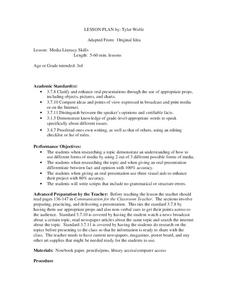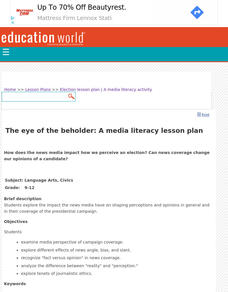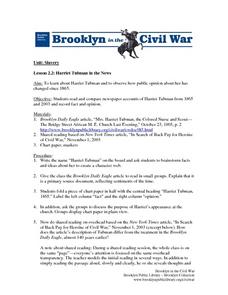Curated OER
Reading And Responding: Lesson 15 Nonfiction
Eighth graders examine a nonfiction selection in a teacher led lesson. They examine the author's purpose for writing the selection and identify the difference between fact and opinion. The compare and contrast expository and narrative...
Curated OER
Media Literacy Skills
You're on camera! Third graders find a news story and research it to get more information. Everyone uses their found information to write a script and create their own news broadcast!
Serendip
Golden Rice – Evaluating the Pros and Cons
More than half the world's population eats rice as a daily staple ... imagine if that rice could prevent illness. Scientists genetically engineered rice to include vitamin A for just that purpose. However, room for debate still exists....
Curated OER
Lead Critical Reading
Students read opposing views on the lead contamination issue, identify the facts and opinions in each article, and infer the opinion of the author. They create an essay expressing their opinion on the issue complete with citations.
Curated OER
Water and Sewage Critical reading
Learners read three articles with different points of view on the water and sanitation issues in the Florida Keys. They identify the facts and opinions in each article and write a summary. In addition, they write an essay expressing...
Curated OER
Food Myths Critical Thinking and Reading
Students read a series of statements made by students about the hazards and benefits of various foods. They distinguish the "facts: from "opinions" in the dialogue, summarize the facts in a short paragraph, and write an essay...
Curated OER
Thinking Out Loud
Students share opinions about whether a series of statements from the internet constitute facts or opinions. They read and analyze blogs published in on the web in order to understand the use of fact, opinion, and tone of voice when...
Curated OER
Lisa Leslie - Women's Basketball Star
Third graders read from their textbooks about Lisa Leslie, the famous American women's basketball star. They discuss the overall disparity of attention and salaries in women's sports compared to men's. They write facts and opinions...
EngageNY
Final Performance Task: Delivering an Opinion Speech with Multimedia Display
Welcome to the grand finale! Scholars practice reading their speeches to a partner and make last-minute changes based on feedback. Pupils then present their final opinion speeches to their small groups and show off their work in a...
Curated OER
The Eye of the Beholder: A Media Literacy Activity
Students explore the impact the news media have on shaping perceptions and opinions in general and in their coverage of the presidential campaign.
Curated OER
The Vikings
Students research and explore Viking culture, distinguishing between fact and fiction, and examine their contribution to our society.
Curated OER
Electrifying Franklin
Fourth graders research and present information about Benjamin Franklin's life and accomplishments. In this lesson on Benjamin Franklin, 4th graders review idioms and sayings written by Franklin then compare and contrast his various...
Curated OER
Ace Inquirer
Students use game simulation software to increase their reading comprehension. They work in teams to determine whether statements are fact or opinion. They complete a Fact/Opinion Scavenger Hunt. They simulate that they are part of the...
Curated OER
Is That a Fact, Harry?
Students use excerpts from books to determine whether sentences are fact, fiction, or opinion. They state reasons for their choices.
Curated OER
Print & Go ESL
Improve reading comprehension with a set of ESL worksheets. Kids read through various passages, note which facts are true or false, mark their opinion on two statements, and write a short reply based on a writing prompt.
Curated OER
The Adventures of Huckleberry Finn: Socratic Seminar
After reading The Adventures of Huckleberry Finn and an article about the use of the novel, class members engage in a Socratic seminar focused on whether or not Twain's book should be banned.
Scholastic
Drones Take Off
Ever wonder what drones are doing high above us in the sky? This article gives your class an insight to what those robots in the sky are doing. After reading an article on drone technology, pupils are prompted to respond to a...
Curated OER
Reading Response Questions
In this reading response worksheet, students answer twenty three questions in short answer format. They answer questions on their reading relating to basic facts, making predictions, explaining why or how, making connections, and giving...
Curated OER
Pioneering Children on the Move
Students inquire about life for pioneer children. In this pioneer period lesson, students analyze photographs of children, make information foldables, and create a covered wagon that was typical of the ones of the past. Students will...
Curated OER
Author's Opinion
Fifth graders read a text about Amelia Earhart's father and use facts from the text to identify the author's opinion. In this author's opinion lesson plan, 5th graders complete a worksheet that is provided.
Curated OER
Prince Ibrahima
Sixth graders read and utilize the facts from the story "Abd al-Rahmen Ibrahima" by Walter Dean Myers to analyze the main character's life which is ruined by conflict, jealousy, and greed. Journal entries are created in response to the...
Curated OER
Harriet Tubman In The News
High schoolers investigate the history of Harriet Tubman. They use newspaper articles from history and modern times in order to gather information. They use a graphic organizer in order to categorize information. They distinguish the...
Curated OER
Family Life
What is family? Challenge your scholars to write an encompassing definition of what this word means to them. After reading "It May Be a Family Matter, But Just Try to Define Family," class members discuss the emotional issues surrounding...
San Francisco Symphony
Mr. Lincoln Through the Eyes of Aaron Copland
Use Aaron Copland's symphonic piece, "Lincoln Portrait" to engage learners in a cross-curricular experience. They'll listen to the piece, watch a video, read the Gettysburg Address, and write a series of fact or opinion sentences. An...

























